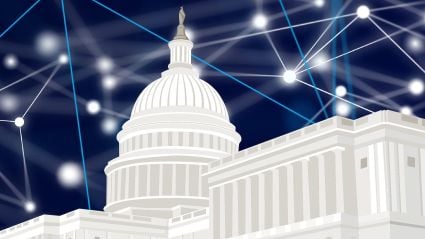Comment Letter
Comment Letter
2025 Digital Asset Market Structure Discussion Draft – US Senate Banking Committee
Resource Downloads
Download Letter
| The Honorable Tim Scott Chair, Committee on Banking United States Senate Washington, DC 20510 | The Honorable Cynthia Lummis Chair, Banking Subcommittee on Digital Assets United States Senate Washington, DC 20510 |
| The Honorable Bill Hagerty United States Senate Washington, DC 20510 | The Honorable Bernie Moreno United States Senate Washington, DC 20510 |
RE: Senate Banking Committee Digital Asset Market Structure Request for Information
Dear Chair Scott, Senator Lummis, Senator Hagerty, and Senator Moreno,
The Milken Institute ("Institute") appreciates the opportunity to submit comments in response to the Senate Banking Committee’s (“Committee’s”) Request for Information (“RFI”) on digital asset market structure. As a nonpartisan, nonprofit think tank, the Milken Institute seeks to advance collaborative solutions that widen access to capital, strengthen financial markets, and increase prosperity for all. Our FinTech Program focuses on responsible financial innovation and emphasizes the importance of open and inclusive financial systems that promote trust, efficiency, and economic mobility.
The Milken Institute applauds the House’s historic, bipartisan passage of the GENIUS Act and the CLARITY Act. The enactment of the GENIUS Act will provide long-sought regulatory clarity for stablecoins as they continue to become a critical component of global cross-border transactions, remittances, commercial payments, and instantaneous settlement.[1]
We commend the Committee’s thoughtful approach to evaluating the current digital asset regulatory landscape. The RFI reflects a timely recognition that while innovation is accelerating, the legal and regulatory frameworks that govern financial markets require modernization and clarity. We appreciate the Committee’s engagement with a wide range of stakeholders and offer the following comments based on our prior work, including our 2025 comment letter on the House Digital Asset Market Structure Discussion Draft.[2]
Our comments focus on the following key areas:
- Clarify the Statutory Definition of Investment Contract and Modernize Token Taxonomy
- Establish Safe Harbor for Transitional and Retroactive Compliance
- Minimize Joint Rulemaking and Maximize Self-Effectuating Statutes
- Expand Retail Protections
- Define Responsible DeFi
- Modernize Regulatory Missions
I. Clarify the Statutory Definition of Investment Contract and Modernize Token Taxonomy
The Institute supports congressional action to provide a clear statutory definition of “investment contract,” rather than relying exclusively on judicial interpretation under the Howey test. Leaving this foundational element of securities law to agency discretion and evolving court precedent introduces significant legal uncertainty for developers, investors, and regulators. Congress should articulate a statutory definition that incorporates economic reality, reflects technological nuance, and establishes predictable criteria for classification.[3]
In parallel, we recommend that Congress adopt a functional taxonomy that distinguishes among digital asset types, such as payment stablecoins, digital commodities, and digital asset securities. This taxonomy should be risk-based and technology-neutral, and provide regulators with the tools to make binding classification determinations. Such clarity will enable safe and responsible innovation and reduce litigation risk.
II. Establish Safe Harbor for Transitional and Retroactive Compliance
We support the creation of a structured safe harbor framework to promote responsible early-stage network development. Building on proposals like Commissioner Hester Peirce’s Safe Harbor 2.0 Proposal,[4] we recommend a time-bound, disclosure-based pathway that allows developers to decentralize or reach a "mature" blockchain status without triggering premature enforcement. This transitional structure should also include eligibility criteria and investor protection provisions to ensure accountability.
Additionally, the Committee should consider providing retroactive relief for projects launched in legal uncertainty, subject to good faith conduct and fraud exclusions. Projects that developed during a period of regulatory ambiguity and without evidence of misconduct should be afforded an opportunity to come into compliance. This approach will promote market integrity while preserving the innovative momentum of the sector.
III. Minimize Joint Rulemaking and Maximize Self-Effectuating Statutes
The Institute encourages Congress to provide statutory clarity wherever possible, particularly for foundational terms and jurisdictional boundaries. Overreliance on joint rulemaking may delay implementation, create interpretive gaps, and discourage market participation.
We recommend that Congress define core terms—such as "digital asset," "blockchain protocol," "digital commodity," and "investment contract"—in statute to the greatest extent possible. Where joint SEC–CFTC rulemaking is necessary, we recommend embedding clear statutory deadlines and outcome-based metrics. Rigorous congressional oversight will be needed to ensure timely progress. This approach will support regulatory efficiency while providing innovators and investors with legal certainty.
IV. Expand Retail Protections
We support the Committee’s focus on consumer protection and recommend incorporating principles of access and financial literacy into any digital asset regulatory regime. Retail users are diverse in age, income, geography, and technical literacy. According to recent Harris polling, a majority of US crypto holders maintain balances under $10,000, and nearly one-third earn less than $75,000 annually.[5]
We recommend requiring plain-language disclosures for consumer-facing digital asset products, particularly where volatility, staking, or yield features are involved. We also recommend that Congress prohibit certain sales by project insiders possessing material nonpublic information that would harm retail investors. A tiered disclosure regime, based on issuer size and product complexity, will help protect users without creating undue burdens on start-ups. Additionally, we support requiring regular, standardized proof-of-reserves for custodial institutions to improve transparency and trust. Finally, we urge Congress to mandate that studies of the digital asset market include analysis of economic mobility, retail investor experience, and barriers to participation.
V. Define Responsible DeFi
The Institute supports responsible treatment of decentralized finance (“DeFi”) protocols and recommends a clear definitional framework to distinguish noncustodial, protocol-based services from centralized intermediaries. To prevent regulatory overreach, terms such as “decentralized finance messaging system” and “trading protocol” must be precisely defined.
We recommend piloting a regulatory sandbox or limited no-action process for DeFi protocols that demonstrate decentralization, public-benefit use cases, or noncustodial operation. Tiered exemptions based on technical architecture and user control can help regulators distinguish low-risk infrastructure from systemically significant platforms. This approach would promote accountability while preserving the permissionless innovation that has defined the sector.
We further recommend Congress requires the SEC, CFTC, and GAO to conduct studies on decentralized finance, non-fungible tokens (NFTs), and market infrastructure improvements needed to facilitate the development of tokenized securities and derivatives.
VI. Modernize Regulatory Missions
The Institute supports Congress adding “promoting innovation” to the SEC’s mission statement. One possible approach is establishing innovation offices within each division of the SEC and codifying its counterpart, Lab CFTC. We recommend Congress provides the SEC with anti-fraud enforcement authority over SEC-registered entities involving transactions with stablecoins and digital commodities, with anti-fraud and anti-manipulation enforcement authorities over exempted decentralized finance activities, and with additional flexibility for the SEC to use its exemptive authority.
We recommend that Congress permits the SEC and CFTC to enter into information-sharing arrangements with foreign regulators to protect investors, building off the success of the International Organization of Securities Commissions (IOSCO) Multilateral Memorandum of Understanding Concerning Consultation and Cooperation and Exchange of Information (MMoU).
We further recommend that Congress clarifies that the SEC and CFTC have the authority to modernize books and records requirements for broker-dealers, exchanges, and other regulated entities by allowing them to use blockchain technology.
Conclusion
The Milken Institute appreciates the Committee’s commitment to developing a responsible and forward-looking framework for digital asset markets. We look forward to continued engagement and offer our support in developing clear, durable, and bipartisan legislation that enhances market integrity, access to opportunity, and responsible innovation.
Sincerely,
Michael Piwowar, Executive Vice President, Milken Institute Finance
Nicole Valentine, Director, FinTech Program, Milken Institute
Maxwell DeGregorio, Senior Associate, FinTech Program, Milken Institute
[1] Milken Institute Statement on Passage of Digital Asset Legislation | Milken Institute
[2] 2025 Digital Assets Market Structure Discussion Draft | Milken Institute
[3] testimony-package_piwowar_06.04.2025.pdf
[4] SEC.gov | Token Safe Harbor Proposal 2.0
[5] https://nca.org/2025%20State%20of%20Crypto%20Holders%20Report.pdf
Resource Downloads
Download Letter









